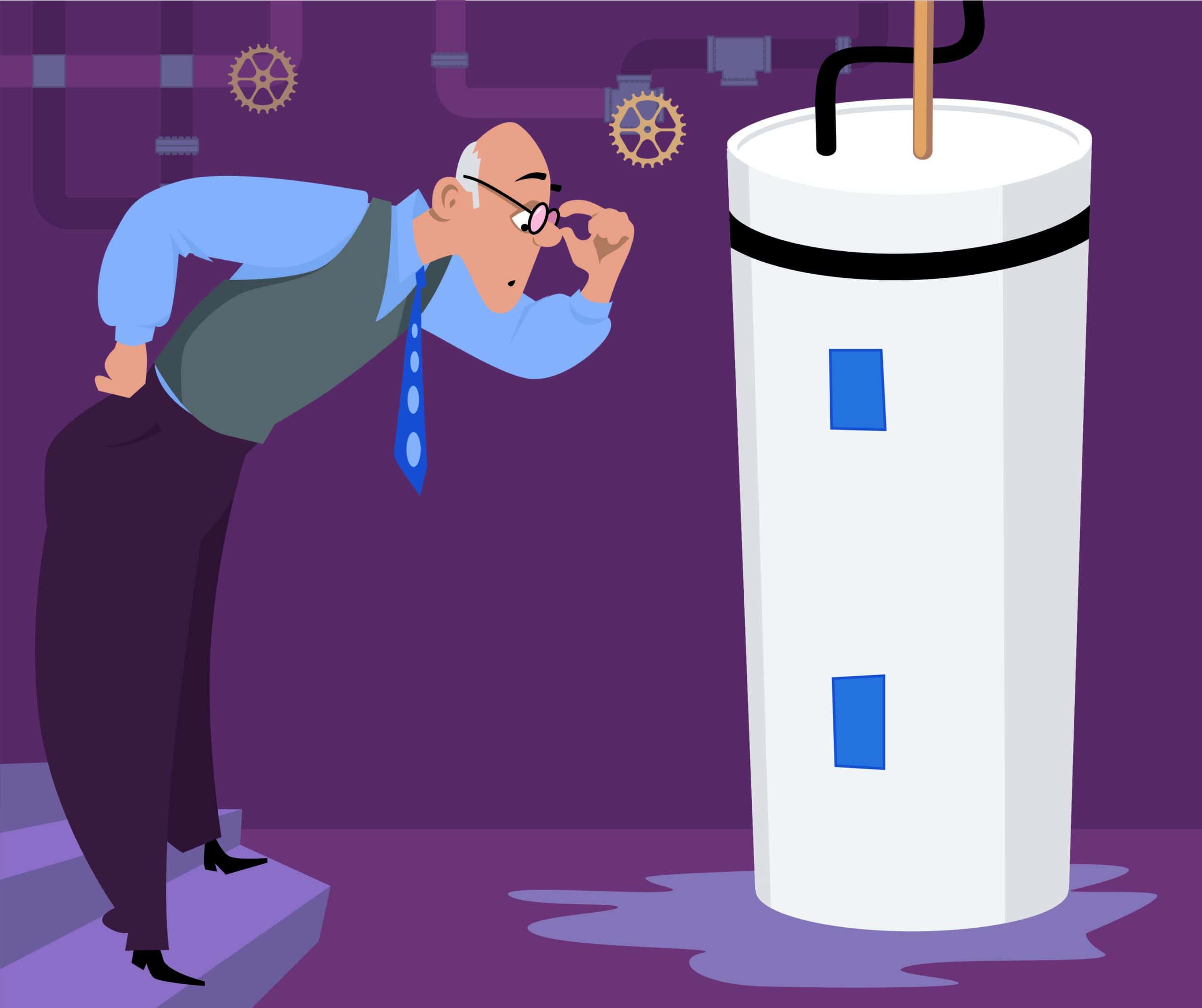A leaking water heater is not rare, and occasionally it is impossible to identify and correct the problem without first using the water heater. So, Can You Take a Shower With a Leaking Water Heater?
Yes, most of the time, it should not be a problem to take a shower with a leaking water heater. A typical water heater often leaks and only releases a tiny amount of water through the delivery pipes, T&P valve, or drain valve. It’s safe to take a shower before addressing a small leak.
Read on to learn where leaks usually occur in a water heater, the dangers, and the steps you should take to address the issue of a leaky water heater.
Where Does My Water Heater Leak From?

Figuring out where the water leaks from the water heater will help you assess the risk and make it easier for you to fix the issue. The following are typical places where leaks occur:
1. Hose for Hot and Cold Water Inlets
Loose hoses are probably the most straightforward cause of a leaky water heater to address. It’s possible that the hot water release or the cold water input is not firmly secured to the tank.
In this situation, all that has to be done is to use a pipe wrench to tighten the tubes at the point of connection.
2. The Drain Valve
A drain valve is present on every typical water heater. The valve, which is close to the tank’s bottom, removes water when repairs or maintenance are necessary.
Ensure the drain valve is correctly closed to see if it is the source of your leak. The valve might need to be replaced if it is fully closed, but liquid is still surrounding the drain opening.
3. T&P Relief Valve
Your water heater has a T&P relief valve that prevents it from malfunctioning and building up too much-compressed air inside the tank. Your water heater should never be in conditions of excessive heat or pressure because they could cause scalding or an explosion.
If the T&P relief valve is not functioning properly, this is because the valve is broken, blocked, there is too much pressure, or due to the hot water inside the tank.
4. Internal Tank
The water tank itself is where most leaks in water heaters occur. It’s likely that your main water tank is compromised if water is collecting under or near the bottom of the heater.
In most cases, dirt buildup is the reason why inner tanks leak. If you don’t clean the debris from the tank, it will rust and fracture the inside.
Unfortunately, you will have to change your water heater if there is an internal tank leakage. The lifespan of your unit can be extended with routine cleaning, but even the most responsible owners eventually need to replace their water heaters.
What Are The Dangers Of Showering When The Water Heater Leaks?
If you find a little leak emerging from your water heater, it is usually safe to shower. Still, there are a few dangers you should be wary of, including the possibility of scorching, explosion, and flooding.
Scalding
Usually, a damaged heater element can harm the regulator or temperature sensor, overheating the water. Your chance of getting scorched shoots up if your bath only has a hot water input.
Explosion
The temperature and pressure are controlled by the T&P valve, which was already discussed. It’s possible for the system’s pressure to rise if this valve is damaged. And some of the fittings may break under excessive force and cause leaks.
Although unexpected, excessive pressure can occasionally lead to the water heater bursting. Your home will probably be damaged by an explosion and may cause serious injury to you and your family members.
Flooding
Flooding is one of the major concerns linked with a leaking water heater, and the risk is increased if you’re taking a shower.
A little leak could turn into a larger concern while you’re washing because of the amount of water that flows through the heater and the excessive water pressure.
A significant leak could harm your pricey floors or cause substantial damage to the building, based on the type of heater you have and its position.
What Should You Do If Your Water Heater Leaks?
It is crucial to take action against a leak as soon as you detect one.
Step 01: Identify the leak’s location.
The first step toward solving a problem is finding it in the first place. It’s best to verify every potential source to ensure we are fully aware of the situation we are dealing with.
The only thing left to do is to look for leaks in those places that are vulnerable to leaking. And we have already discussed the potential place of leaks in this article.
Step 02: Turn off the electricity and empty the tank
The water heater must always be turned off as the following action.
Use the circuit breaker box to shut off your electric water heater. Find the right breaker, activate it, and then double-check that you have entirely disconnected any possible electricity.
Since water conducts electricity, operating near water heaters where electricity could enter through the cables is not a good idea.
For gas heaters, all you have to do is shut off the switch or any power-shutoff mechanism that your gas water heater possesses.
After you have switched off the electricity, drain the tank. This is crucial for identifying and fixing issues because it provides a clearer view of the whole heater.
Step 03: Remove the water supply
The following step is to turn off the source of water since you wouldn’t want water to start running again into the tank after you’ve emptied it.
Since it is the line that enters the water heater, you should first turn off the cold water supply.
If you can access the valve manually, that should be relatively simple and will stop water from entering the heater.
Step 04: Get experts on the line.
It would be preferable to contact experts right away if you observe any severe water heater danger warnings. If there are significant problems, they can also find them by performing more thorough inspections.
Are Water Heater Leaks an Emergency?
No, at least in most of the cases. A leaking water heater is not regarded as an emergency. Water heater leaks usually start tiny, so you should have enough time to address the problem effectively.
If there is a risk of scorching or flooding, or the tank has burst, it should be treated as an emergency. A leak caused by pressure build-up is the worst-case situation for a leaky water heater.
If you think this might be the case, speak with a specialist right away so they can evaluate the circumstance.
FAQ
How can you detect leaks in a water heater?
Often, you can detect a leak before seeing any apparent signs of water damage. While standing next to your water heater, if you notice water flowing or leaking, investigate the sound and look for visible evidence of a leak.
If water is audible, but there is no visible leak, the tank may have broken.
Why is there a leak beneath my water heater?
Typically, a buildup of dirt inside the tank is the primary factor. If debris isn’t regularly removed from the tank, the steel tank will start to rust and split. A leak will ultimately appear with enough time.
The water heater almost usually needs to be changed if there is a leak coming from the tank directly.
Can you survive without a water heater?
Practically speaking, we could live without hot water. In the early stages of human evolution, people did not have warm water for drinking or cleaning. We could live without a steady supply of hot water, even if it could be annoying not to be able to take a hot shower or wash our hands comfortably.
Conclusion
A leaking water heater is not the end of the world. And thanks to this article, you now know if you can take a shower with a leaking water heater. But this issue must be addressed immediately because a leaking water heater might lead to a massive accident.

Amos Christen graduated with a bachelor’s degree in Interior Design from Drexel University — Philadelphia, PA. Since 2003, Amos has worked with top interior design professionals in this area, including architects and interior/graphic/lighting designers. As a skilled interior designer, Amos Christen is highly versed in fine arts and crafts and uses that to supplement his main area of expertise. He often publishes articles related to home décor on several websites, including Sprucetoilets.com, Sprucebathroom.com, and Mybesuitedhome.com. He also contributes to leading interior design magazines.
